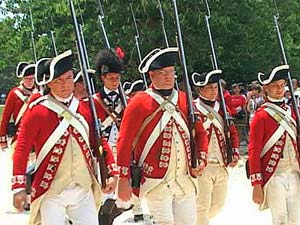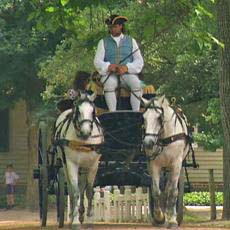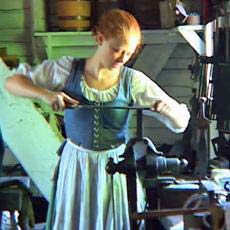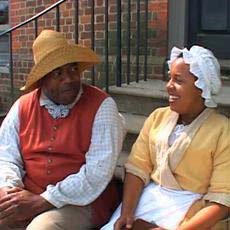|
 More than 1,500 costumed interpreters and re-enactors roam the streets of colonial Williamsburg every day. |
They give tours, answer questions and discuss topics as varied as wig-making or 18th-century manners. Bill Rose is a character interpreter who portrays a man who lived during the Revolutionary War.
"If you have a good interpreter, you don't have to change the facts of history," says Bill Rose, a character interpreter who portrays a man who lived during the Revolutionary War. "They can make those facts palatable and enjoyable to a modern audience and can help draw those connections and that's the best thing in the world."
The actors dress, talk and work as if they lived in colonial times. Some portray multiple characters while others re-enact one specific role. For most, re-enactment is their full-time job and career.
|
 Horses and carriage in Colonial Williamsburg. |
Before they start portraying an 18th century character, the actors attend history classes, costume fittings and rehearsals.
Half of Williamsburg's 18th-century population were slaves of African origin, since slavery had not yet been abolished.
"What I do puts a human face on what was going on," says Hope Smith, who interprets a slave. "You're able to see the Revolutionary War through the eyes of the specific character that I am doing. You're able to connect what happened to an individual through their eyes. So it's not just these big events."
|
 Williamsburg re-enactors dress in 18th century clothing and demonstrate how Americans lived at the time of the Revolutionary War. |
"People have a lot of preconceived notions about blacksmiths and it's interesting to see people come in with what they know and see how surprised they are when they realize what's going on."
|
 These interpreters give voice to half of Williamsburg's 18th-century population: slaves of African origin. |
"Today people go to jobs that they hate in offices and they loathe being there," says Ocketzo, "but every day in a blacksmith's shop there's really engaging, fascinating, satisfying work to do."
Tourists can see the re-enactors and interpreters at Colonial Williamsburg year round, rain or shine. Besides being novel and interesting, the actors give color and meaning to a place steeped in history and the origins of American democracy.
interpreter: a person who performs a piece of music or a role in a play in a way that clearly shows their ideas about its meaning(演绎音乐、戏剧中人物的人)
re-enactor: a person who enacts a role in an event that occurred earlier(在历史剧中扮演角色的人)
How a family helped save American folk music
Umatilla Indian maintains storytelling tradition
Folklife Festival takes visitors to the ancient country of Wales
(来源:VOA 编辑:陈丹妮)
